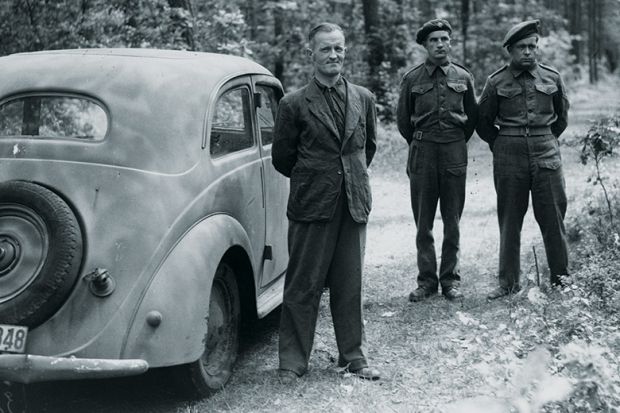Everyone in wartime Britain knew of the announcer on German radio by his nickname, Lord Haw-Haw (pictured above after his arrest), but few knew much of the man behind the voice with its slightly odd intonation, as with his famous “Jairmany calling”, before asking listeners disturbing questions such as “Where is the Ark Royal?” There were, as Colin Holmes has discovered, many mysteries surrounding William Joyce, for he both embellished and covered his tracks.
Where exactly was he born and when: in 1903, 1904 or 1906; and in America, England or Ireland? Did the long scar on his face really come from his being knifed by a Jewish Communist? Joyce embroidered his CVs and his accounts of his career changed with his circumstances and loyalties. Is it even certain that he was Lord Haw-Haw? There were many renegades working for German radio and the nickname suggests an upper-class accent, which fits Norman Baillie-Stewart better than Joyce, but it was Joyce, the more successful broadcaster, who became the accepted bearer of the nickname. How effective were his broadcasts and how many listened to him? It’s easy to dismiss their impact and to see the nickname, “Haw-Haw”, as an example of the cheerful sangfroid of the British facing the war with confident good humour. But millions listened to him, and his sneers, especially in 1940, did much to undermine confidence.
Holmes’ book is at once a complex piece of detective work and a psychological study. He follows the twisting thread of Joyce’s life and a political career that took him through the complex history of the British far Right between the wars, to Germany in 1939 and to his execution in 1946. In many ways it is a sad story. Cosseted as a child by an over-fond mother who idolised him, he developed early a considerable estimation of his ability and prospects that even modest success would be unlikely to confirm. He had ability and gained a first-class degree in English after studying at Birkbeck College, but his narcissistic personality made him too vain, impetuous and unreliable to settle on any career until radical politics seemed to offer an affirmation of the genius he felt he possessed, and he became in succession a member of various fascist and pro-German organisations. Such groups were notoriously fratricidal and Joyce quarrelled with leaders and rivals, most notably with Sir Oswald Mosley, until he ended up on the wildest shore, the slavishly pro-Hitler and anti-Semitic National Socialist League, before leaving for Germany just before the Second World War.
Did Joyce deserve to be executed? Probably not in strict legal terms, for, although he was a most unpleasant man and in common sense terms an obvious traitor, the law was clearly stretched to find him guilty, a verdict that, in the circumstances of the time, public opinion demanded. As the author suggests, “the state’s response was in conjunction with such [popular] sentiment”.
As Holmes recognises, Joyce was not really a figure of major importance, and he and other Nazi sympathisers “exercised less influence than Soviet agents”, but this intensively researched book is fascinating and valuable for the way the author weaves Joyce’s quest for fame and adulation into the fabric of inter-war Britain. In the study of one individual, Holmes demonstrates the pressures and illusions that drove minorities to extreme messianic faiths.
A. W. Purdue is visiting professor in history, Northumbria University.
Searching for Lord Haw-Haw: The Political Lives of William Joyce
By Colin Holmes
Routledge, 494pp, £75.00 and £14.99
ISBN 9781138888845 and 8869
Published 15 August 2016
后记
Print headline: The voice of Jairmany calling




